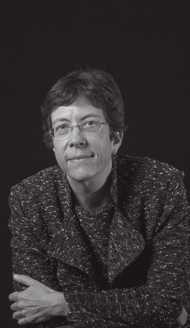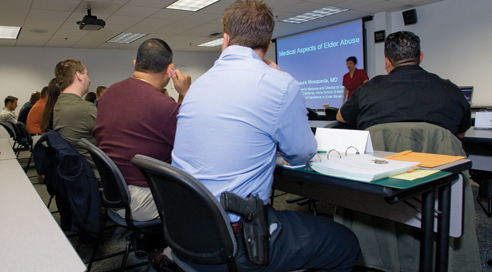Advocating for Abused and Neglected Seniors
Laura Mosqueda, MD
As Director of the Program in Geriatrics at the University of California, Irvine, Laura Mosqueda, MD, put her interest in the detection and prevention of elder abuse to work as founder of a medical response team that provides consultation on elder abuse cases, an elder abuse forensic center, and an Elder Abuse Prevention Coalition.

Dr. Laura Mosqueda
Dr. Mosqueda was making a difference in the lives of older adults, but in her position as Director of the Program in Geriatrics, she felt she could benefit from some guidance. “Like many physicians, I never received formal training related to leadership,” says Dr. Mosqueda. Her successes at the helm of the Program in Geriatrics and on a national level in the area of elder abuse are largely due to the skills and confidence she gained as a Hartford ADGAP Leadership Scholar.
“Dr. Mosqueda inherited a program that needed strengthening at the University of California, Irvine, and she turned it into a marquee program,” says Dr. David Reuben.
The ADGAP Leadership Scholars Program provided her with practical information about budgets, personnel, and strategic planning, and the opportunity for professional and personal growth. Feedback from mentors and colleagues helped her gain personal insights and paved the way for dealing with difficult and challenging situations. “I became a better person,” says Dr. Mosqueda, “calmer and more confident in my ability to lead our program.”
For Dr. Mosqueda, the mentorship aspect of the ADGAP program was transformational. It allowed her to raise the visibility and credibility of the geriatrics program within the medical school. By having her dean
as her internal mentor, she began to meet with him regularly. “This strengthened our relationship and provided me with valuable insights,” she says. She was invited to high level meetings and learned about the inner workings of the medical school. Years later, she still attends weekly meetings with the dean. “I’m in the loop,” she says.
 Dr. Laura Mosqueda giving a presentation on "Elder Abuse Investigation" at the Orange County, California Sheriff's Training Facility to detectives and police officers.
Dr. Laura Mosqueda giving a presentation on "Elder Abuse Investigation" at the Orange County, California Sheriff's Training Facility to detectives and police officers.
By forming relationships with influential leaders throughout the medical school, Dr. Mosqueda learned how to negotiate with other departments. She utilized this knowledge and her connections to put together a complex proposal and obtain a $2 million grant from the Donald W. Reynolds Foundation to infuse geriatrics into every department in the medical school. “Every medical student who graduates from this university will have the tools to provide superb care to senior patients because of this grant,” says Dr. Mosqueda.
During this time, Dr. Mosqueda never abandoned her work on elder abuse. In fact, she raised the standing of the geriatrics program even further with the formation of the Center of Excellence in Elder Abuse and Neglect, funded by the Archstone Foundation. The Center provides medical, forensic, and victim services to abused and neglected seniors and serves as a resource for technical assistance, best practice information, and multidisciplinary training on a national scale. “As the center has grown, the ADGAP program has helped me to be a better leader, especially in dealing with diverse groups of professionals,” says Dr. Mosqueda. The Center works with people from the medical school, the school of social ecology, as well as social workers, prosecutors, law enforce-ment officers, and others in the criminal justice system. “It brings a new meaning to the term interdisciplinary,” says Dr. Mosqueda.
“Dr. Mosqueda is a trailblazer,” says Rebecca Guider, Director of Adult Services and Assistance Programs, Orange County, California, who has collaborated with Dr. Mosqueda for over ten years to combat elder abuse. “She’s willing to tackle the medical community, the law enforcement community, and the bureaucratic social service community.She inspires and motivates them to understand the problems of elder abuse and to get behind solutions.”
Next: A Call to Leaders in Practice
Geriatric Nursing Leadership Academy ›
